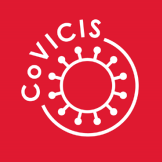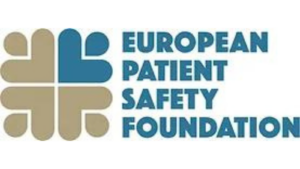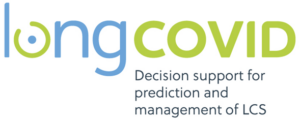ORCHESTRA has been pleased to collaborate with the following projects:
END-VOC, a project funded by the European Union, supports the global response to COVID-19 and future pandemics by aiming to evaluate the circulation and impact of current and emerging SARS-CoV-2 variants of concern (VOC).To do so, data from well-established patient and population cohorts across the world are used.
Data is collected from 28 cohorts in 23 countries to address five key questions:
- Detection and characterization of emerging variants
- Study of immune evasion and reinfections
- Evaluation of VOC’s ability to escape current treatments
- Explore the causes of Long Covid
- Provide recommendations to improve the management of future infectious disease outbreaks.
END-VOC – Keeping tabs on SARS-CoV-2

COVICIS is a project funded by the European Union´s Horizon Europe Research and Innovation Programme with primary objectives focused on contributing to early identification of emerging Variants of Concerns (VOCs), and obtaining in-depth understanding of the risk and protective factors to SARS-CoV-2 infection as well as the evolution of the virus in different risk, gender and age groups. The ultimate goal is to advance the understanding of the virus biology and evolution, as well as the identification of immune correlates of protection of disease and/or vaccination.
COVICIS´s mission is build around its five objectives:
- Identifying emerging new VOCs through genomic surveillance in different cohorts
- Deciphering the risk and protective factors to infection in different risk, gender and age groups
- Evaluating the impact of VOCs on the effectiveness of vaccines induced humoral and cellular responses in different populations and regions in the European Union and Sub-Saharan Africa
- Identifying immune correlates of protection against VOC through the development of algorithms predicting the impact of emerging VOC on the efficacy of vaccines
- Informing the future vaccination strategy and design of the next generation of vaccines.


The European Patient Safety Foundation (EUPSF) is an independent, public interest foundation. It constitutes a neutral knowledge and best practices exchange platform for innovative, meaningful, sustainable and replicable solutions for Patient Safety improvement.
The EUPSF is a multi-speciality oriented group believing that a significant improvement in patient safety is possible only by empowering patients and healthcare professionals through people-driven, collaborative, sustainable approaches.
Its mission is not only to empower people for patient safety but also to develop innovative, meaningful, sustainable and replicable patient safety projects; to create a European multidisciplinary platform for exchanging knowledge and best practices; finally, to promote and stimulate the application of best practices that lead to long-lasting changes in safety culture in healthcare.
The group participates in the activity of the ORCHESTRA project – not only as a stakeholder but also as member of the COVID-19 Global Guidance Group (CGGG), which is an external panel of experts that evaluates and provides feedback on the scientific production of the whole Consortium.

ReCoDID (Reconciliation of Cohort data in Infectious Diseases), is a four-year project supported by the European Commission under the Horizon 2020 Programme and by the Canadian Institutes of Health Research Institute of Genetics (CIHR-IG). The consortium brings together a multidisciplinary team from four continents to fast track the research response to viruses and other pathogens by facilitating data and sample sharing between infectious disease cohort studies.
Objectives:
- Identify and address the political, ethical, administrative, regulatory, and legal (PEARL) barriers and solutions related to combining, analyzing and sharing a range of datatypes and specimens across infectious disease cohorts.
- Develop and implement a roadmap, tools and analytical methods to reconcile, analyze and link human clinical, epidemiological, and diagnostic laboratory data within and across infectious disease cohorts.
- Develop and implement a roadmap, tools and analytic methods to reconcile, analyse and link « high density laboratory » data with synthesized clinical-epidemiological metadata from objective 2.
- Develop a local governance model and searchable portal for decentralized cataloguing of data repositories and biobanks.
ReCoDID builds on existing infrastructures and partnerships to develop a sustainable model for the storage, curation, and analyses of the complex data sets collected by infectious disease (ID)-related cohorts. While ID cohorts collect both clinical-epidemiological and terabytes of OMICS data, storage and analysis of CE and high dimensional laboratory data remains separate and developing the infrastructure for housing and analyzing high dimensional laboratory data is generally not feasible for individual studies.

SYNCHROS (SYNergies for Cohorts in Health: integrating the Role of all Stakeholders) is a three-year, Horizon 2020, Coordination and Support Action (CSA) funded by the EU Framework Programme for Research and Innovation. The objective of SYNCHROS is to create a sustainable European strategy for the development of a next generation of integrated cohorts population, patient and clinical trial cohorts.
Europe is extremely well served by a rich variety of population, patient and clinical trial cohorts. However, the enormous potential benefits of their rich information have not been optimally exploited. Through intensive stakeholder involvement (researchers, funding bodies, clinicians, coordinators of previous harmonization and integration exercises), SYNCHROS will meet the need for an international strategic agenda for enhanced coordination and collaboration of cohorts globally. SYNCHROS will address the practical, ethical and legal, and the methodological challenges to optimising the exploitation of current and future cohort data, map the cohort landscape in Europe and large international initiatives, identify the best methods for integrating cohort data, identify solutions for addressing practical, ethical and legal challenges in integrating data across patient, clinical trial and population cohorts, and evaluate the use of emerging and new data collection technologies and types of data. Finally, SYNCHROS will make sustainable recommendations on standards to improve future sample, data collection and data sharing methods and disseminate this information so as to contribute to defining an international strategic agenda for better coordination of cohorts in Europe and beyond.

EuCARE (European cohorts of patients and schools to advance response to epidemics) is a project funded by the European Union´s Horizon Europe Research and Innovation Programme, which encounters the COVID-19 epidemics and in particular the newly emerging SARS-COV-2 variants with the support of strong immuno-virological and artificial intelligence components.
For this, EuCARE gathers clinical cohorts from 10 strategic countries across Europe, Africa, Central and South America. Overall, the hospitals have enrolled, until now, more than 44.000 hospitalised patients, PASC and healthcare workers (HCW) from very diverse countries, with a wide coverage of different vaccines, different healthcare systems, different viral variants, distributions and different treatment protocols.
Additionally, EuCARE focuses on schools, expanding the ongoing school screening program from Germany and Mexico to include newly enrolled schools in Portugal and Italy, covering all school grades. The school cohort now includes 28 schools in Italy, Portugal and Mexico, with more than 460 classes across all ages, from very diverse areas in terms of urbanisation, socioeconomic status, containment protocols and use of PPEs.
 Longcovid a Horizon Europe Long COVID project led by HUS Helsinki University Hospital, works to elucidate the predisposing factors and mechanisms for the development of the Post-COVID Condition (PCC). The research evidence created during the project will be simultaneously used to develop and improve the care of Long Covid patients suffering from the long-term effects of COVID-19 infection. The project will develop and apply a machine learning (ML) and artificial intelligence (AI)-informed Long Covid Prediction Support (LCPS) tool to predict and stratify the PCC patients. Additionally, an interactive infographic will be available to clinicians and patients; this will communicate novel and understandable information about PCC and recommendations for patient management. Apart from HUS, the Consortium consists of many leading EU research organisations, such as the University of Helsinki, the University of Basel, the University of Zurich and the University Medical Center Groningen. A German company NEC specialised in artificial intelligence and machine learning is involved in the study. Other companies involved include Lipotype, Nuromedia and Steinbeis Europa Zentrum from Germany, Protobios from Estonia, Chino from Italy and Spinverse from Finland.
Longcovid a Horizon Europe Long COVID project led by HUS Helsinki University Hospital, works to elucidate the predisposing factors and mechanisms for the development of the Post-COVID Condition (PCC). The research evidence created during the project will be simultaneously used to develop and improve the care of Long Covid patients suffering from the long-term effects of COVID-19 infection. The project will develop and apply a machine learning (ML) and artificial intelligence (AI)-informed Long Covid Prediction Support (LCPS) tool to predict and stratify the PCC patients. Additionally, an interactive infographic will be available to clinicians and patients; this will communicate novel and understandable information about PCC and recommendations for patient management. Apart from HUS, the Consortium consists of many leading EU research organisations, such as the University of Helsinki, the University of Basel, the University of Zurich and the University Medical Center Groningen. A German company NEC specialised in artificial intelligence and machine learning is involved in the study. Other companies involved include Lipotype, Nuromedia and Steinbeis Europa Zentrum from Germany, Protobios from Estonia, Chino from Italy and Spinverse from Finland.  VERDI is a project funded by the European Union’s Horizon Europe programme, with a Consortium consisting of 29 centers worldwide. It is coordinated by the University of Padua and Penta Foundation (Italy), with scientific coordination shared between University of Padua and University College London. VERDI sets out to prioritise pregnant women, children and high-risk populations in research on new SARS-CoV-2 variants of concern and works closely together with other COVID-19 and MonkeyPox research projects at EU level and beyond. The Consortium collaborates with ORCHESTRA on clinical data sharing and harmonization through the Cohorts Coordination Board (CCB), which brings together EU-funded COVID-19 cohorts and other key stakeholders.
VERDI is a project funded by the European Union’s Horizon Europe programme, with a Consortium consisting of 29 centers worldwide. It is coordinated by the University of Padua and Penta Foundation (Italy), with scientific coordination shared between University of Padua and University College London. VERDI sets out to prioritise pregnant women, children and high-risk populations in research on new SARS-CoV-2 variants of concern and works closely together with other COVID-19 and MonkeyPox research projects at EU level and beyond. The Consortium collaborates with ORCHESTRA on clinical data sharing and harmonization through the Cohorts Coordination Board (CCB), which brings together EU-funded COVID-19 cohorts and other key stakeholders.
 unCoVer (‘Unravelling Data for Rapid Evidence-Based Response to COVID-19’) is a functional network of 29 partners capable of harvesting real-world data derived from the response and provision of care to COVID-19 patients by health systems across Europe and internationally. These real-world data comprise mostly information from electronic medical records from front-line hospitals, as well as national surveillance data, registries, and integrate information from over 300,000 COVID-19 patients initially, and anticipated to increase as databases are being updated on a continuous basis. Studies into patient’s characteristics, determinants of diseases prognosis, and safety and effectiveness of treatments and potential strategies against COVID-19 in real-world settings, are envisioned to complement findings from efficacy/safety clinical trials where vulnerable populations, those most at risk of severe COVID-19, are often excluded. unCoVer’s ultimate goal is to bring together European and international expertise to monitor, identify, and facilitate the access and utilization of this type of data, identifying knowledge gaps, and underrepresented populations, and proactively seek synergies with complementary existing and planned clinical databases.
unCoVer (‘Unravelling Data for Rapid Evidence-Based Response to COVID-19’) is a functional network of 29 partners capable of harvesting real-world data derived from the response and provision of care to COVID-19 patients by health systems across Europe and internationally. These real-world data comprise mostly information from electronic medical records from front-line hospitals, as well as national surveillance data, registries, and integrate information from over 300,000 COVID-19 patients initially, and anticipated to increase as databases are being updated on a continuous basis. Studies into patient’s characteristics, determinants of diseases prognosis, and safety and effectiveness of treatments and potential strategies against COVID-19 in real-world settings, are envisioned to complement findings from efficacy/safety clinical trials where vulnerable populations, those most at risk of severe COVID-19, are often excluded. unCoVer’s ultimate goal is to bring together European and international expertise to monitor, identify, and facilitate the access and utilization of this type of data, identifying knowledge gaps, and underrepresented populations, and proactively seek synergies with complementary existing and planned clinical databases.
QualityMetric (QM), a clinical outcomes assessments solutions provider and scientific consultancy specialising in patient-reported outcomes provides ORCHESTRA with SF-36v2 PRO Survey. How do subsequent public health responses may affect the well-being of the patients? Which therapeutic measures are appropriate? QualityMetric’s SF-36v2 PRO Survey will enable to find answers to these questions and add to existing knowledge on the course of the disease, its long-term health implications and the likelihood of patient reinfection.
The survey will be used, together with other tools, to quantify the impact of the disease’s spectrum of symptoms on the functional health and well-being of affected patients from their own point of view. Additionally, development is in progress to produce country specific preference weights for the SF-6Dv2, a health state utility index scored from the SF-36v2, which will support future efforts to evaluate the cost effectiveness of healthcare interventions of SARS-CoV2.
Please find QM’s press release here: